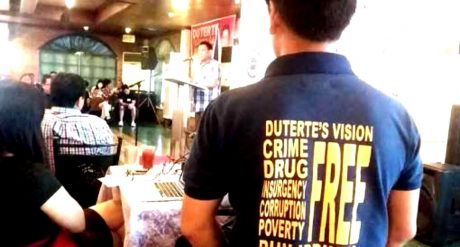
Everyone loves the Mission Impossible franchise. That’s because the best stories are about people who’ve hurdled the seemingly impossible, stared down the intractable, and succeeded against all odds. It is the reason thatStar Wars fans find that over-used battle ending where proton torpedoes are used to hit a target that is “only two meters wide” (in Episide IV) to destroy a planet-sized Imperial weapon so deeply satisfying. Whenever Batman laments “We’ve got one chance, Robin!” whenever he and his charge find themselves in a sticky situation, we hang on to our seats waiting for the anticipated happy ending.
The Philippines’ War on Drugs is an impossible mission. A certain Robert Francis Garcia says so…
Studies worldwide have clearly established that a “war on drugs” can never be won. War is simply not the effective approach.
But how is this war different from all the other “impossible” missions the Philippines faces? None of these impossible wars have been won — not the war on poverty, not the war on corruption, and certainly not the war on ignorance, among other challenges. Even implementing a half-decent public transportation system seems to be impossible in the Philippines. And yet, succeeding in all these “impossible” tasks is an essential prerequisite to seeing a Philippines go from Third World to First World — the same way Singapore did. The facts are simple. If the Philippines remains home to a poor, corrupt, ignorant, and immobile society, it will not progress.
Those are all clichés. But it is precisely why they are clichés that made them the truisms so deeply-etched into peoples’ psyches. More importantly, them being clichés doesn’t change the simple fact that they are challenges that need to be surmounted.
Perhaps it is time that Filipinos start adding the phrase “by whatever means necessary” to that call to action. Over the last 30 years since the 1986 people power “revolution”, Filipinos believed that their “restored” democracy would be the be-all-end-all solution to poverty, corruption, ignorance, and crime. Yet after 30 years, no amount of “democracy” could change the Philippines. The country, despite its “freedom” remains essentially the same — ruled by a thieving oligarchy repeatedly voted into office by ignorant voters. Worse, Filipinos feel less safe and less secure — internally cowed by crime and externally pressured by a hostile foreign power.
Rightly or wrongly, this is the reason why Filipinos embraced an outlier president from Davao and his law-and-order-west-of-the-Pecos style of combatting crime. The simple truth is that the extremist brand of bleeding-heart liberalism that traditional post-1986 politicians espoused and the foggy notions of “human rights” they perverted to its cause no longer fly with Filipinos. Filipinos have had enough with giving suspected crooks the benefit of the doubt in an ivory tower conceived system that is seen to consistently fail ordinary citizens. In short, liberals have none other to blame but themselves. They had, over the last 30 years, turned the character of Philippine society into one akin to an emotional basketcase — perenially starved for affection, addicted to celebrity validation, dependent on divine intervention, always on the lookout for a hero to deliver salvation, and suffering from a wholesale lack of perspective.
Emotional basketcases are the types who prefer to stew in their misery rather than jump out of bed and face the world with eyes wide open. If Filipinos were to do just that and look at their situation wide-eyed, they will behold the results of three decades of doing the same thing over and over againwhilst expecting different results. Many of the problems that crush the Philippines’ hopes of becoming a better nation someday were caused by theflawed thinking that more freedom and more softly-softly approaches will make things better.
That, quite simply, did not happen. And we are now here at a crossroads — where the wise saying of Albert Einstein comes with more relevance than ever: that you cannot solve problems using the same thinking that created them.
One concludes that 30 years of bleeding-heart thinking created the inutile nation that is the Philippines today at the risk of falling into a post hoc ergo propter hoc fallacy. But it is quite clear that 30 years of no resultsemotionalism pretty much debunked the notion that 20 years of dictatorship is what “caused Philippine poverty”. The Philippines has now been in a “restored” democracy far longer than those two decades of “dark ages” under former President Ferdinand Marcos that Filipinos were led to believe was the singular contributor to the country’s failure to prosper.
It’s high time Filipinos learn that their poverty has nothing to do with politics and nothing to do with leadership. Just as the Filipino-Chinese community prospered under both a “dictatorship” and a “restored democracy” Filipinos in the same way, remained impoverished in both repression and freedom. It is in this frame that, we are told, fighting a “War on Drugs” is an impossible mission.
It is not.
We only perceive it as such because of the mistaken belief that politics matter to the ordinary Filipino.
It doesn’t.
Politics matter only to those who have a lot to lose — those who invested billions in the Liberal Party’s failed attempt to hang on to power, and those who’ve bet equal sums on seeing the government of Rodrigo Duterte fail.
But to the average Filipino, the only thing that matters is that crime be stopped and the lives of their loved ones be made safer. Seen from that perspective, no mission to achieve that can be regarded as impossible. Only when we begin to see the mission for what it is — one that must succeed — will we appreciate the pettiness of the politics of the “debate” that surround it and the small mindedness that paint it as “impossible”.
http://www.getrealphilippines.com/blog/2016/08/winning-dutertes-war-drugs-mission-impossible/

No comments:
Post a Comment